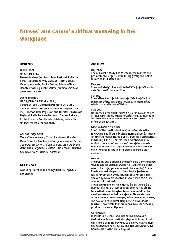Please use this identifier to cite or link to this item:
http://hdl.handle.net/11054/115| Title: | Nurses' and carers' spiritual wellbeing in the workplace. |
| Authors: | Fisher, John Brumley, David |
| Issue Date: | 2008 |
| Publisher: | Australian Nursing Federation. |
| Place of publication: | Kingston, ACT. |
| Publication Title: | The Australian Journal of Advanced Nursing |
| Volume: | 25 |
| Issue: | 4 |
| Start Page: | 49 |
| End Page: | 57 |
| Abstract: | Objective: The aim of the study was to investigate nurses' and pastoral carers' spiritual wellbeing (SWB) and how it relates to their workplace. Design: The study design was a survey of total populations in selected health care services. Setting: The setting was a public and a private hospital in a regional setting, and three hospices in major cities which had a religious affiliation. Subjects: Responses were obtained from 154 (11%) nurses and 8 (6%) carers in the public hospital, 40 (7%) nurses in the private hospital and 16 nurses and 7 carers (17%) in the three hospices. Main outcome measure: The Spiritual Health and Life Orientation Measure (SHALOM) was used to provide insights into staff ideals for spiritual wellbeing, as well as their lived experiences in relating with self, others, the environment and/ or God. The nurses' and carers' perceptions about how well clients are supported in these four domains of spiritual wellbeing in their workplace were also explored. Results: The beliefs and worldview of health care staff influence their ideals for spiritual wellbeing (SWB) to a greater extent than age, gender, or workplace setting. These ideals markedly impact on their lived experiences which reflect their SWB. Ten percent of these staff showed spiritual dissonance in more than one of the four domains of SWB. The major finding of this study is the influence that nurses' and carers' personal experience has on the level of help they thought clients received from the services offered in their workplace. Those who are more fulfilled in relationships, with themselves, others, the environment and/or God, believe that clients receive greater help in these areas from the services provided in their workplace. Conclusion: SHALOM is a useful indicator of four domains of SWB of health care staff who project their own lived experience onto the way they see clients having their spiritual wellbeing nurtured. This has implications for health care staff in the workplace. |
| URI: | http://hdl.handle.net/11054/115 |
| Resource Link: | http://search.informit.com.au/documentSummary;dn=210173636815527;res=IELHEA http://www.ajan.com.au/ajan_25.4.html |
| ISSN: | 0813-0531 |
| Internal ID Number: | 00101 |
| Health Subject: | HOLISTIC NURSING NURSES - RELIGIOUS LIFE NURSING - RELIGIOUS ASPECTS SPIRITUAL CARE - MEDICAL CARE SPIRITUAL HEALTH AND LIFE ORIENTATION MEASURE - SHALOM |
| Type: | Journal Article Article |
| Appears in Collections: | Research Output |
Files in This Item:
| File | Description | Size | Format | |
|---|---|---|---|---|
| AJAN101.pdf | Reproduced with permission from AJAN | 281.86 kB | Adobe PDF |  View/Open |
Items in DSpace are protected by copyright, with all rights reserved, unless otherwise indicated.
